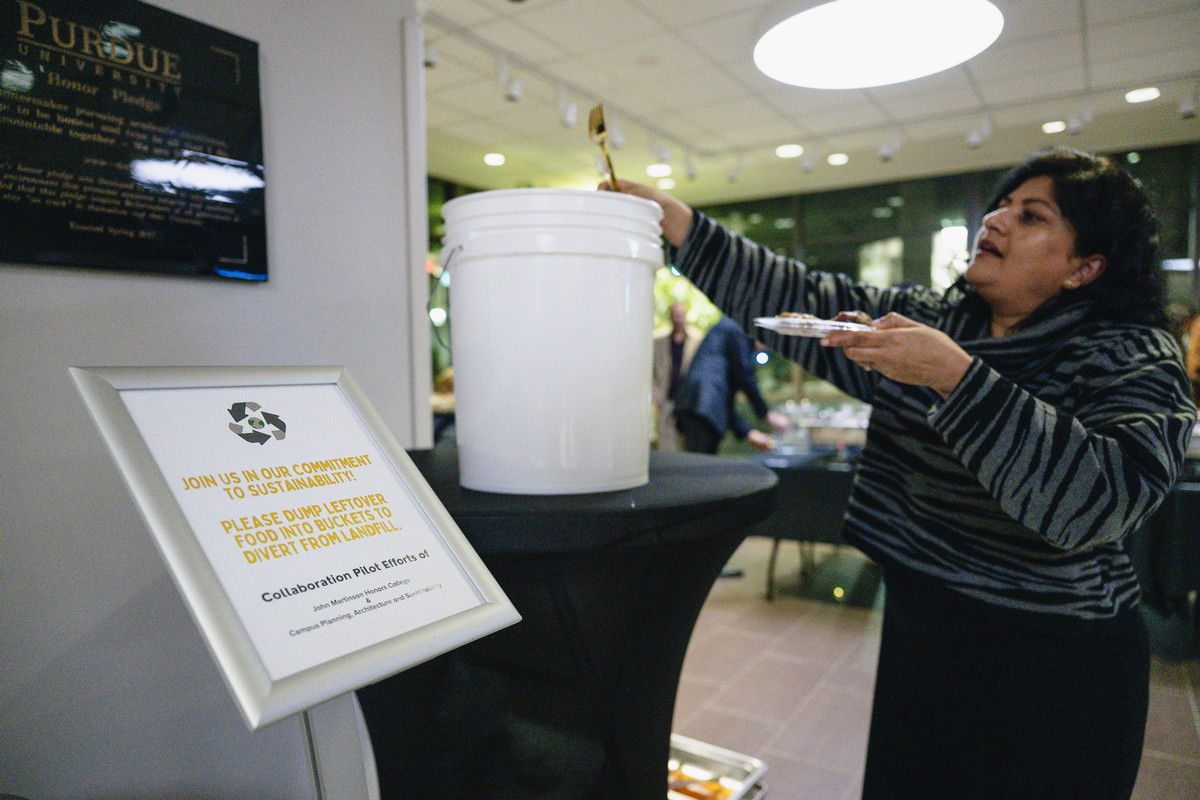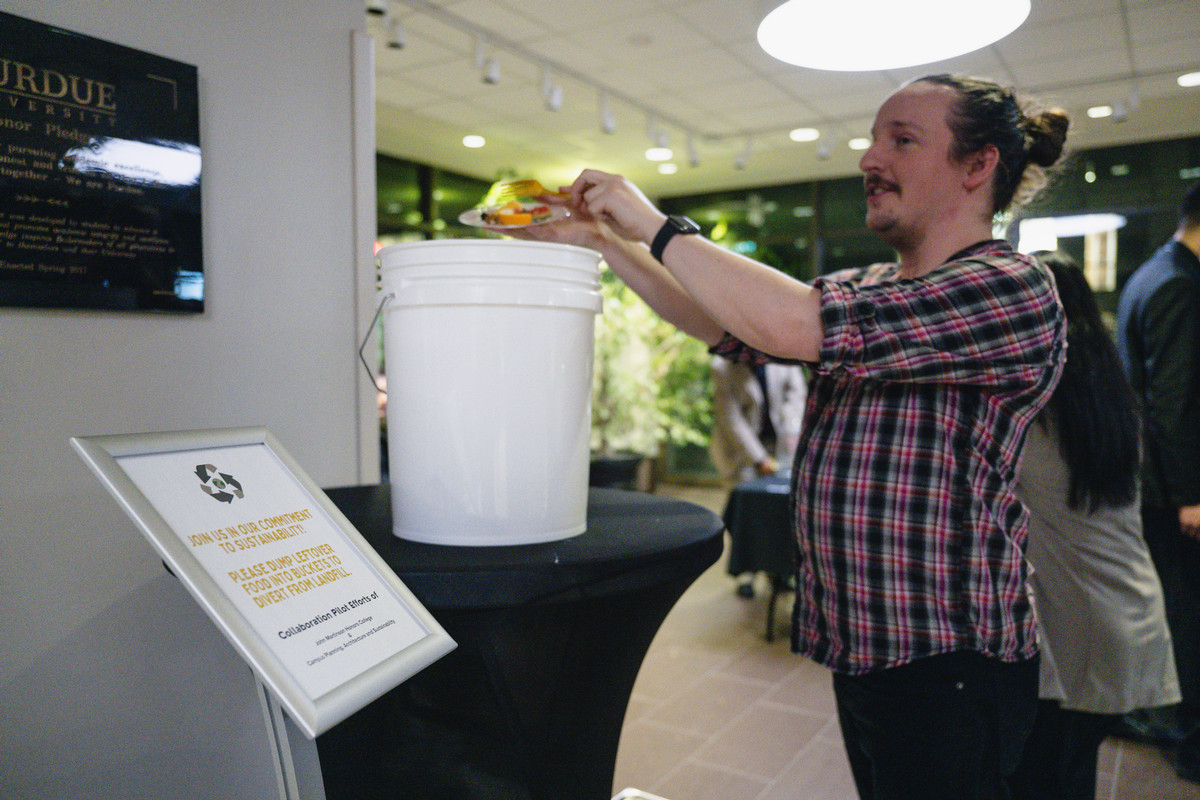Celebrating Earth Month: John Martinson Honors College partners with Purdue’s sustainability team to reduce food waste, promote eco-friendly practices

In an effort to foster more sustainable practices, the John Martinson Honors College (JMHC) has partnered with Purdue’s Campus Planning, Architecture and Sustainability (CPAS) team to implement a series of initiatives aimed at reducing waste and promoting eco-conscious behaviors.
Rosanne Altstatt, assistant dean for Community and Engagement in the JMHC, initiated the collaboration and highlighted the importance of sustainability to the college, citing a survey conducted by the JMHC’s undergraduate research unit last year that identified climate change as a top concern among students, instructors and staff. Both campus partners entered this initiative in hopes it could serve as a pilot that other academic units could look to as a model.
One of the key initiatives involves reducing food waste from events hosted by the Honors College. With the help of CPAS, the JMHC has piloted a system to measure and track food waste, with the goal of progressively reducing the percentage of waste generated.
Additionally, efforts have been made to minimize single-use plastics and other disposable items at events, with a focus on utilizing reusable alternatives. Altstatt emphasized the importance of community engagement in these sustainability efforts, noting that students have played a crucial role in implementing and advocating for eco-friendly practices.
As part of their commitment to sustainability, the Honors College has also introduced a “reducing swag” initiative, which encourages the use of environmentally friendly alternatives to traditional promotional items. Instead of distributing disposable giveaways at events like Spring Fest (April 13, 2024), the college has shifted toward interactive activities that promote sustainability, such as making laundry soap using recycled plastic bottles and donating them to Food Finders. Beyond reducing waste, this initiative helps foster community engagement, one of the college’s four pillars, and awareness around sustainability.
“Partnering with Purdue’s Campus Planning, Architecture and Sustainability team to enhance sustainability efforts aligns perfectly with our commitment to fostering a greener campus environment for all,” Altstatt shares. “Implementing initiatives like food waste reduction and thinking more sustainably about our swag goes beyond reducing our college’s environmental footprint; it helps us cultivate a culture of eco-consciousness and community engagement. Together, we can lead by example and make a meaningful impact.”
Creating actionable steps to help drive change
Michael Russell, JMHC student community manager, has been helping with the implementation of reducing food waste and promoting sustainable practices in the Honors College. With a background in biology and a focus in sustainability, Russell says the idea of creating positive change related to sustainability aligns with his personal values and academic areas of interest.

Pictured: Michael Russell, JHMC student community manager, empties leftover food as a part of the Honors College sustainability efforts
From addressing the issue of single-use plastic bottles to exploring innovative approaches like using the JMHC’s Suitable app to encourage sustainable practices, Russell and his team have been at the forefront of driving sustainable behaviors.
“The goal is to showcase actionable steps that individuals can take to contribute to sustainability,” he shares. “Whether it's diverting food waste from landfills or creating eco-friendly alternatives, every effort counts.”
One notable endeavor spearheaded by Russell and his team is the development of the Sustainability badge for the JMHC’s Suitable app. Designed to empower students to engage with sustainability initiatives on campus, the badge offers a roadmap for meaningful action.
“We wanted to create a framework that aligns with the triple bottom line of sustainability: prosperity, people and planet,” he explains. “By earning the Sustainability badges, students not only gain recognition for their efforts but also acquire valuable insights into how their actions can make a difference.”
Partnering with Purdue’s Campus Planning, Architecture and Sustainability team
Tony Gillund, director of sustainability for Purdue’s Campus Planning, Architecture and Sustainability unit, encourages other individuals and programs to evaluate their existing systems to identify areas for improvement; April is a fitting time to consider these opportunities because it is Earth Month, he adds.
“It’s about evaluating what you do to understand your areas of opportunity,” he shares. “It’s never a one-size-fits-all approach, but collective efforts and a commitment to sustainable practices can make a significant difference in Purdue’s overall impact, especially when you tie in education and awareness.”
The Sustainability Team also strives to engage students through research and learning to assist in finding and studying viable solutions. “In the case of Honors College and Residences, we investigated and continue to explore opportunities for Honors College students to engage in research for the buildings where they reside," Gillund says.
Looking ahead, CPAS is working to develop a resource for events with practical strategies to minimize waste and maximize sustainability that other units can apply to their own efforts. From economic considerations to environmental impact, sustainable behaviors offer multi-faceted benefits, he notes.
“It’s important to approach sustainability as a shared responsibility,” he says. “It goes back to the idea of a triple bottom line; there’s an environmental impact of our behaviors, as well as an economic and social impact, and each one affects us all.”

Andrea Mattingly
Communication Director for Teaching and Learning, thomas78@purdue.edu